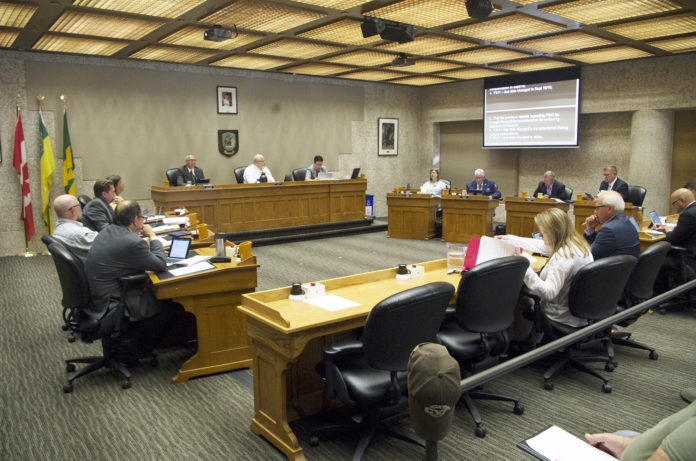Prince Albert city council is one step closer to restricting public access to back alleys and walkways, however the move comes over the objections of one councillor who worries it will lead to racial profiling.
Ward 2 Coun. Terra Lennox-Zepp said the motion, which allows the Planning and Advisory Committee to start working towards drafting a new bylaw, sets a dangerous precedent for the city.
“My concern is that this will impact some groups more than others,” Lennox-Zepp said during Monday’s council meeting. “This type of restriction can contribute to racism in our city. I have heard from members of the public on both sides of this issue … and I’m not aware of any other city that, city-wide, has such a restriction.”
Lennox-Zepp pointed to cases in Edmonton, where Indigenous leaders have accused the city’s police force of targeting racial minorities for street checks far more often than white men and women. A CBC investigation in June 2017 revealed that Indigenous people were six times more likely to be checked compared to white people.
Even before the CBC report, chiefs in Alberta were saying street checks were eroding trust between Indigenous people and police. Edmonton police have conducted an audit of all street checks. A spokesperson told the CBC that they couldn’t say racial profiling never happened, but they were confident it wasn’t happening regularly.
Lennox-Zepp said that experience should make Prince Albert’s elected officials think twice about creating a bylaw that would allow police to stop and question anyone found in a back alley or walkway past a certain time.
“I sympathize with the reasons (for creating the bylaw),” she said. “People are frustrated (with petty crime.) I do understand both sides of the issue. However, I have very strong concerns about such an unusual bylaw.”
Lennox-Zepp and Ward 1 Coun. Charlene Miller were the only two councillors to vote against Monday’s motion. Other members of council said the proposal had received overwhelming support from residents, who are angry about the amount of crime they’re seeing in the city.
“I’ve not received a single email opposing this from any residents,” Ward 3 Coun. Evert Botha said. “This (motion) gets us somewhere.”
“For us, it might seem like a small step, a little step, but to the victims of crime in those back alleys, those neighbourhoods, this is huge,” Ward 5 Coun. Dennis Ogrodnick added. “This is not little. This is a huge step that this council is taking.”
Ogrodnick said he has only received two messages from people who oppose restricting back alley and walkway access after midnight. Neither of them live in Prince Albert. Lennox-Zepp, however, said she’s received multiple messages opposing such a restriction. Monday’s council packed included six letters in support of restricting back alley access. Another eight letters of support were added to the packet on Monday. Those letters had not been received by the time the agenda was made public last week.
Ward 8 Coun. Ted Zurakowski, who was responsible for starting the discussion back in August, said there’s no evidence this bylaw would lead to racial profiling.
“Back alleys and walkways are a conduit to petty crime in our city, perhaps unlike any city in the province,” he said. “We need to deal with that problem, and not run away from it by speaking about unreasonable fears, by speaking about red-herrings, the ifs and the what-abouts.”
Zurakowski added that a similar city bylaw, which restricts access to public parks, has not led to a rise in racial profiling, and said it’s unfair to say Prince Albert will have a problem with racial profiling just because other communities do.
“(It’s) totally, totally unfair to characterize our police department like that, who I know have bent over backwards to develop relationships,” he said.
When asked if the city has any plans to discuss the proposal with the Prince Albert Grand Council, Zurakowski said conversations with the PAGC were ongoing and continuous.
Council debates $150,000 price tag
Racial profiling wasn’t the only concern raised during Monday’s debate. There were also questions about the cost of implementing such a bylaw, specifically the $150,518 required for new signs on all walkways and back alleys.
Lennox-Zepp argued those funds could be put to better use by being included in the city police budget, instead of going towards signs that criminals were going to ignore anyway.
“I hear some members of the public telling me that the city already has enough bylaws that we don’t have the resources to enforce,” she said. “I think if we asked Joe Citizen, ‘do you think we should spend $150,000 on signs or do you think we should spend $150,000 on policing’ I think I know what Joe Public is going to tell us. Put that money into policing and get the resources out there so we’re not just putting up silly signs where in a few years people are saying, ‘what is the point of that?’”
“That’s the elephant in the room that has not been spoken about tonight, and that’s the focus we really need to think about come budget deliberations in December,” she added.
However, many councillors said they were comfortable with the $150,000 price tag.
“It shows that this council cares about crime,” Ward 6 Coun. Blake Edwards said during the meeting. “Cost? This is small potatoes in the big picture…. This is a one time expense to put some signs up, and what it does, in my opinion, is it makes crime a little bit more uncomfortable to commit in our city.”
Zurakowski said he’s not convinced the $150,000 figure is correct. He’s waiting until budget time to see if administration alters it.
“I don’t believe that’s an accurate number,” he said during the meeting. “I believe we can flesh that out when we get to budget.”


